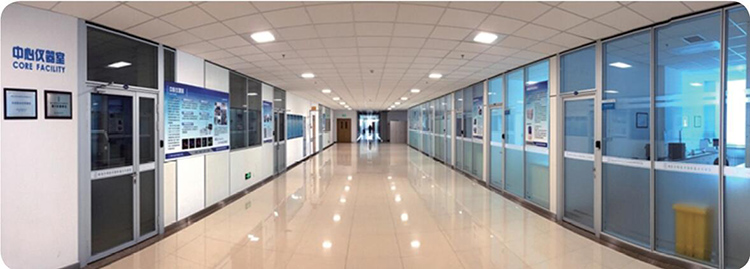State Key Laboratory of Veterinary Biotechnology (SKLVB) is located in Harbin, a famous city in northeast of China. It is the major research section of Harbin Veterinary Research Institute (HVRI), Chinese Academy of Agricultural Sciences (CAAS), which was the first research institute in veterinary medicine since the establishment of the People’s Republic of China. The SKLVB, which was awarded the "National Key Laboratory for Excellence" in the sixth evaluation of the national key laboratory for biology and medicine in 2017, marks a significant improvement in its innovation and management capabilities.

Construction of SKLVB facilities started in early 1986 and completed in late 1988, and the facilities started operation on June 1, 1989. Aiming to become an internationally eminent laboratory in veterinary biotechnology, SKLVB has focused on the research of genetic engineering of animal pathogens, cell engineering, molecular biology, and other areas of basic research in veterinary medicine. Throughout recently 30 years’ development, SKLVB has become a strong and influential laboratory combining basic research with applied research, focusing on the study of animal infectious diseases and zoonosis pathogen genetic variation, pathogenicity and immune mechanisms at the molecular biology level, as well as the development of preventive, diagnostic or therapeutic cell engineering and genetic engineering products.
SKLVB has five research area: Pathogenesis and Disease Control Strategies, Novel Vaccines and Diagnostic Techniques, Epidemiology and Evolution of Pathogens, Veterinary Fundamental Immunology, Experimental Animal Resources and Model Animals. SKLVB has 88 staff including 57 senior scientists (26 professors, 31 associated professors), 31 assistant professors.
In 2018 SKLVB conducted 202 research projects with annual funding fifty million yuan from the National Key Technologies R&D Program of China, the National Natural Science Foundation of China, and the National Key Research and Development Plan and international research collaborations. SKLVB has a postdoctoral program for preventive veterinary medicine, along with the doctors and masters degree programs. There are 25 PhD program supervisors, 91 master program instructors and more than 300 graduate students. SKLVB is responsible for training a large number of research personnel in veterinary molecular biology, pathogen research, and animal production. These researchers are utilizing their expertise in their careers.
A total of 175 scientific achievements have been awarded to faculty at SKLVB, including one first-class prize, five second-class prizes, and three third-class prizes of National Science and Technology Progress Award; two second-class prizes of National Technology Invention Award; one first-class prize, two second-class prizes, and two third-class prizes of Science and Technology Progress Award from the Ministry of Agriculture (MOA); two first-class prizes of Heilongjiang Provincial Natural Science Award; one first prize for technical inventions in Heilongjiang; seven first-class prizes, six second-class prizes, and five third-class prizes of Heilongjiang Provincial Science and Technology Progress Award; and two hundred and twenty –one patent. The award for the research on the development and application of inactivated vaccine for H5 subtype avian influenza has made a great contribution to the animal disease control and prevention in China.

SKLVB is strengthening communications and collaborations with other research institutions by providing regular academic meetings and activities. SKLVB has established the State Key Laboratory of Veterinary Biotechnology Open Foundation to support talented researchers outside. In addition, SKLVB has closely cooperated with industries and businesses to quickly transform the research results to actual products.
In recent years, SKLVB has established numerous international collaborations through visits, personnel exchanges, and training programs. These activities have strengthened the collaborative relationships with other institutes abroad; brought more opportunities for research collaborations; and raised the SKLVB’s research to a higher level on the veterinary biotechnology and the control and prevention of major animal diseases.
|
